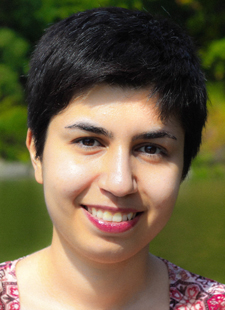Columbia Electrical Engineers Win Another Qualcomm Innovation Fellowship and $100,000 Stipend
For the fifth year in a row, a Columbia Engineering team has won a coveted Qualcomm Innovation Fellowship
For the fifth year in a row, a Columbia Engineering team has won a coveted Qualcomm Innovation Fellowship. Electrical engineering PhD student Negar Reiskarimian is on one of just eight teams to recently receive one of this year’s fellowships. With faculty advisor Electrical Engineering Associate Professor Harish Krishnaswamy and research partner Ahmed Kord of the University of Texas at Austin, Reiskarimian will receive $100,000 in funding and mentoring from Qualcomm engineers for their innovation, “Fully-Integrated Reconfigurable Magnet-less Non-reciprocal Components for Next-Generation Wireless Communication Systems,” which represents a potential game-changer for wireless communications.

PhD student Negar Reiskarimian
—Image courtesy of Negar Reiskarimian
They will use this stipend to develop compact, novel antenna interfaces for next-generation communications systems such as full-duplex wireless, by which devices should be able to simultaneously transmit and receive data on the same frequencies, vastly improving spectrum efficiency.
“It is quite extraordinary that Columbia Engineering has won the Qualcomm Innovation Fellowship five years running, and this is also the third year in a row that students from the CoSMIC lab have won this prestigious and competitive award,” said Krishnaswamy. “This year’s project is particularly exciting as it blends applied electromagnetics with integrated circuits to realize new non-magnetic non-reciprocal devices that have the potential to revolutionize wireless communications.”
In March, Reiskarimian and Kord traveled to Qualcomm’s San Diego headquarters to present their work at the Innovation Fellowship finals, competing with 33 other finalists selected from among 129 applicants representing 18 universities. Projects spanned a range of research interests including the Internet of Things, mobile security, machine learning, and semiconductors, with winners including teams from MIT, Stanford, Carnegie Mellon, and Berkeley.
Reiskarimian, who studied telecommunications and microelectronic circuits at Iran’s Sharif University of Technology, came to Columbia in 2013 to pursue research in analog/RF integrated circuits and systems research as a graduate research student in Krishnaswamy’s CoSMIC (Columbia high-Speed and Mm-wave IC) lab, concentrating on the future of wireless communication. She is also a member of the FlexICoN (Full-duplex Wireless: From Integrated Circuits to Networks) project.
